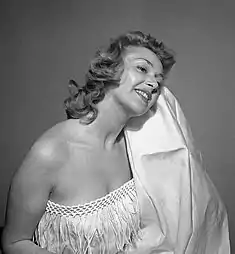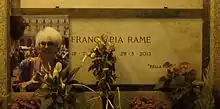Franca Rame
Franca Rame (18 July 1929 – 29 May 2013) was an Italian theatre actress, playwright and political activist. She was married to Nobel laureate playwright Dario Fo and is the mother of writer Jacopo Fo.[1] Fo dedicated his Nobel Prize to her.[2]
Franca Rame | |
|---|---|
 | |
| Member of the Senate | |
| In office 28 April 2006 – 28 April 2008 | |
| Constituency | Piedmont |
| Personal details | |
| Born | 18 July 1929 Parabiago, Italy |
| Died | 29 May 2013 (aged 83) Milan, Italy |
| Nationality | Italian |
| Political party | Italy of Values |
| Spouse(s) | |
| Children | Jacopo Fo |
| Parents | Domenico Rame Emilia Valdini |
| Occupation | Theatre actress, Playwright |
| Website | http://www.francarame.it/ |
Biography


Franca Rame was born in Parabiago, Lombardy, in 1929,[3] into a family with a long theatre tradition. She made her theatrical debut in 1951. Shortly thereafter, she met Dario Fo, whom she married in 1954. Their son, Jacopo was born on 31 March 1955. In 1958, she co-founded the Dario Fo–Franca Rame Theatre Company in Milan, with Fo as the director and writer, and Rame the leading actress and administrator.[4]
Rame continued working with Fo through many plays and several theatre companies, popular success and government censorship. She was active in Soccorso Rosso (Red Aid), writing letters and providing books for prisoners and assisting their families and lawyers.[5] In the 1970s, Rame began writing plays (often stage monologues) of her own, such as Grasso è bello! and Tutta casa, letto e chiesa, which displayed a markedly feminist bent.
In March 1973, fascists who were reportedly commissioned by high-ranking officials in Milan's Carabinieri (Italian gendarmerie) abducted Rame, held her at gunpoint and dumped her in a van. They raped her, beat her, burnt her with cigarettes, slashed her with razor blades and left her in a park.[6][7] She returned to the stage after two months with new anti-fascist monologues.
Rame became a member of the PCI in 1967.[8] She was a member of the Italian Senate representing the centre-left anti-corruption Italy of Values (IdV) party.[9] In 2006, she was designated candidate for President of Italy by IdV's leader, Antonio Di Pietro, but she obtained only 24 votes on the first ballot of the presidential election. From 2010 she was, also with her husband, an independent member of the Communist Refoundation Party.[10]
She died in Milan in 2013, at the age of 83, and is buried at the city's Monumental Cemetery.[3]
Partial filmography
- Ha fatto tredici (1951)
- Lo sai che i papaveri (1952)
- Lo svitato (1956)
- Rascel-Fifì (1957)
References
- Mitchell 1999, p. 55
- Mitchell 1999, p. 232
- John Francis Lane (29 May 2013). "Franca Rame obituary". The Guardian. Retrieved 29 May 2013.
- Mitchell 1999, p. 61
- Mitchell 1999, pp. 119–120
- Kuennecke, Beret (April 2002). "Resistance Takes Centre Stage". Review.
Review of 'Harlequins of the Revolution', Joseph Farrell, Methuen, which mentions the rape
- Mitchell 1999, p. 122
- Mitchell 1999, p. 89
- "Franca Rame's resignation letter" (PDF) (in Italian).
- "Franca Rame". Official PRC website (Regional Federation of Lombardy) (in Italian).
Further reading
- d'Arcangeli, Luciana and Pagliaro, Annamaria (eds). “Dario Fo & Franca Rame. Beyond the Rules”, Spunti e Ricerche,Volume 31, 2016, published in 2017.
- d'Arcangeli, Luciana. "Franca Rame’s Dowry: How the Rame Family Tradition Lives on in the Theatre of Dario Fo and Franca Rame" in Donatella Fischer (ed.) The Tradition of the Actor-Author in Italian Theatre. Oxford. Legenda, Italian Perspectives, 27, 2013, pp. 136–145.
- Rame, Franca and Farrell, Joseph. "Non è tempo di nostalgia" – interview with Franca Rame, Della Porta Editori, 2013.
- d'Arcangeli, Luciana. "The Rape by Franca Rame: Political Violence and Political Theatre" in Pierpaolo Antonello and Alan O'Leary (eds) Imagining Terrorism: The Rhetoric and Representation of Political Violence in Italy, 1969–2009. Oxford, Legenda, 2009, pp. 101–115.
- d'Arcangeli, Luciana. "Dario Fo, Franca Rame and the Censors" in Guido Bonsaver and Robert Gordon (eds) Culture, Censorship and the State in 20th Century Italy. Oxford, Legenda, 2005, pp. 158–167.
- d'Arcangeli, Luciana. Madness in the Theatre of Dario Fo and Franca Rame. Forum Italicum, Stony Brook (NY), Spring, 2005, pp. 138–165.
- d'Arcangeli, Luciana. 'Franca Rame: Pedestal, Megaphone or Female Jester?' in Ed Emery (ed) Research Papers on the Theatre of Dario Fo and Franca Rame. Cambridge, 28–30 April 2000". London and Sydney, Red Notes, 2002, pp. 49–59.
- Farrell, Joseph. Dario Fo and Franca Rame: harlequins of the revolution. Methuen, 2001.
- Jenkins, Ronald Scott. Dario Fo & Franca Rame: artful laughter. Aperture, 2001.
- Mitchell, Tony (1999), Dario Fo: People's Court Jester (Updated and Expanded), London: Methuen, ISBN 0-413-73320-3.
- Valeri, Walter (ed). Franca Rame. A Woman on Stage. West Lafayette, Bordighera Press – Purdue University, Indiana 2000.
External links
| Wikimedia Commons has media related to Franca Rame. |
- (in Italian) Official website
- Franca Rame at IMDb